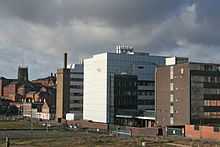BioCity Nottingham
| BioCity Nottingham | |
|---|---|
 Biocity buildings | |
| Formation | September 2003 |
| Legal status | Science park |
| Purpose/focus | Bioscience innovation |
| Location | Pennyfoot Street, Nottingham, NG1 1GF |
| Region served | UK |
| Membership | 70 companies |
| Chief Executive | Dr Glenn Crocker |
| Main organ | BioCity Board (Chairman – Dr Louis Nisbet) |
| Affiliations | Nottingham Trent University, University of Nottingham, |
| Website | BioCity |
BioCity Nottingham is a bioscience science park in central Nottingham in the United Kingdom. It is the UK's largest bioscience innovation and incubation centre.
History
In 2002, laboratories and office space were donated to Nottingham Trent University by BASF. Biocity was founded in September 2003 by the University of Nottingham, Nottingham Trent University (NTU) and the East Midlands Development Agency (which is based close to BioCity).
Biocity's premises were developed from the building donated by BASF. Phase 1 was completed in March 2004, providing 36,000 sq ft (3,300 m2) of space, then Phase 2 in March 2006 provided 24,000 sq ft (2,200 m2). When Phase 3 of the development was completed in October 2008, with 45,000 sq ft (4,200 m2), funding from emda also finished.
Background
Nottingham has long been an important centre for bioscience research, principally through work done at the University of Nottingham, Nottingham Trent University and by Boots, Britain's largest retail pharmacy company, which is based in Dunkirk/Beeston. Although Boots no longer engages in drug discovery, Ibuprofen (iso-butyl-propanoic-phenolic acid) was created by Boots scientists in Nottingham.[1] In March 2005 Nottingham was named as a Science City; the other 5 Science Cities were Birmingham,[2] Bristol, York, Newcastle[3] and Manchester.
Structure
It is situated in former BASF buildings, which previously were used by Boots as research laboratories.
The site on Pennyfoot Street, between the A60 and A612, is for bioscience SMEs. The University of Nottingham has the largest collaboration with companies at BioCity, with a few having links with NTU.
There are three buildings –
- Innovation Centre Building
- Stewart Adams Building – named after Dr Stewart Adams OBE, who led the team at Boots (with John Nicholson) that discovered Ibuprofen, a non-steroidal anti-inflammatory drug, in 1963[4]
- Laurus Building
In January 2012 BioCity opened a second site, BioCity Scotland, resulting from the acquisition of a former MSD research facility near Glasgow.
See also
- Sheffield Bioincubator
- London Bioscience Innovation Centre
- Francis Crick Institute
- Creative Quarter, Nottingham